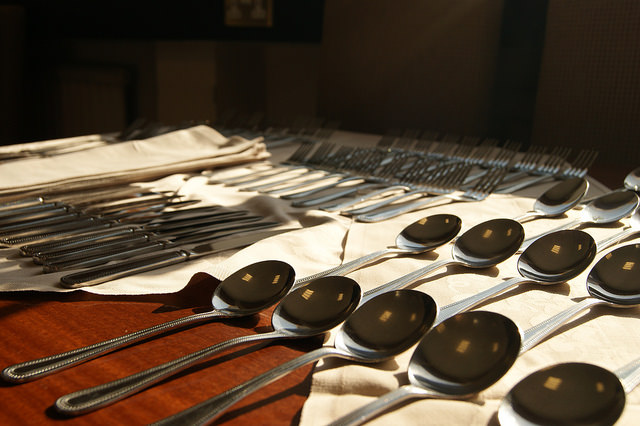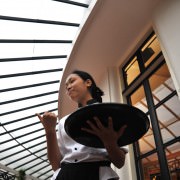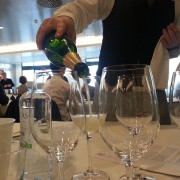5 Mistakes Even Veteran Servers Make
Every journey begins with a single step. And a server’s career begins with several missteps. Anyone who has ever worked in a restaurant, or anywhere for that matter, has made mistakes traveling along their job’s learning curve. Most aren’t a big deal and can be laughed away, or used as fodder for hazing newbies and rookies on staff. Some mistakes an be charged to inexperience, but there are a handful of bad habits that even veteran servers fall into. It’s up to management to identify and coach these bad habits out of servers through proper training. Here are 5 mistakes that all severs make, and tips to correct them.
1. Offering The Check Too Soon

Sometimes it’s difficult to gage when a table is actually finished with their meal and ready for the bill. One mistake that servers make is to offer the guests the check before the server is positive that the guests are done ordering. This can cause the restaurant to lose money on guests, and also has the potential to make the guests feel rushed. I understand the need to turn tables during peak hours, but leaving money on the table is never a good idea. Even after a table appears finished, when the plates are cleared and guests are leaning back into their chairs and communicating with belly slaps to show how full they are, they still might not be done. It’s key to make ensure they are actually done spending money.
Quick Fix: Before handing a check out, the server should qualify that their tables are ready to leave. Offering dessert, another round of drinks, and then actually ask the question, “Are you ready for the bill, then?” Only then should a server bring over the bill. This process may seem unnecessary at first. But it will ensure two things: that the guest decides when to leave, and that the server and restaurant generate the highest sales from each customer.
2. The Inability to Prioritize Importance During Service
This one is a bit tricky. Often time prioritizing tasks due to importance will seem like a loose-loose situation. You’re always sacrificing one thing in favor of another. But every server in a restaurant will have to step foot into this situation room, and handling it correctly means that you recognize the most efficient service for the entire restaurant.
What priorities are we talking about here? To start, anything to do with guest interaction and service on the floor should take place over back-of-house or custodial issues. For example, if the kitchen calls out for extra hands to run food, that takes priority over bringing a bus tub of glassware to the back. Of course, cleaning and replenishing glassware is important, but in the case of priorities, running food is more important because it directly affects guest experience.
Quick Fix: Management should set clear guidelines on the hierarchy of service. When done properly, prioritizing tasks doesn’t mean something isn’t getting done. What it should mean is that staff members have specific roles, so a server doesn’t get caught up doing work that another staff member should be focusing on. In the example mentioned above, if a server chooses to run food instead of clearing glassware, then they should alert another staff member to handle the glassware issue while they run hot food to a hungry table.
3. Letting Sidework Interrupt Service

This is a pet peeve of many restaurant managers. This generally happens towards the end of the night, as service slows, reservations are all in, and maybe the kitchen has stopped serving food. Servers work late hours, so shaving time off their shift at the end of night is important. But servers shouldn’t let side work interrupt customer service. Too often, guests are searching for their servers and the servers are no where to be found. This should never happen. Nor should a server or bartender perform closing duties in a way tells the guest it’s time to leave. There are, of course, guests who are oblivious to the workings of a restaurant and outstay their welcome, but this situation can be regarded as an outlier.
Quick Fix: There isn’t necessarily a quick fix here. The fix actually falls inline with the priority issue discussed above. Servers need to be able to prioritize their work at the end of the night. One way management can help avoid this situation is by giving closing servers duties that keep them on the floor. Duties like breaking down tables and clearing candles. This avoids giving a reason to closing servers for being off the floor. Another policy is to implement a rule where certain side work cannot be done before the lights are turned on, which, of course, won’t be until the guests have left.
Uncorkd is Digital Menu Program That Makes Managing a Restaurant Easier. Learn how!
4. Not Using Trays To Transport Glassware
This one comes down to visuals. Or the optics of the situation in contemporary parlance. Using a tray can be intimidating, especially for young servers or those who claim being clumsy as a handicap. But it’s a necessary tool for the job. It’s like if carpenters ignored tool boxes in favor of impossibly bear-hugging their tools against their chests.
Whats the big deal with forgoing the use of trays? To start, avoiding tools that makes your job easier will, obviously, make your job tougher. It also leads to unwanted consequences like gripping glassware on the inside of the glass (gross!), and can lead to broken glassware or spilt drinks that can mar your work uniform. It also just looks bad to guests.
Quick Fix: Practice using a tray if your uncomfortable with it. If you are comfortable, don’t be lazy, and take the extra steps needed to get a tray. To help reduce the extra time spent on grabbing a tray, set yourself up for success and strategically place server trays at different stations in the restaurant.
5. Falling Behind an Issue

Too many servers opt to fall behind an issue instead of getting in front of it. Essentially, this happens when servers don’t properly inform guests about an issue when it first comes up, or, when a server knows that an issue has a high probability of occurring.
Here’s an example. If a party of 6 orders a round of labor intensive cocktails, it will take longer for them to receive their drink order than if they ordered a bottle of wine. This is especially true on busy nights during peak service hours. A good server should get ahead of issues like this by telling them that it may take a few minutes longer because these cocktails take longer to prepare, but that it will be worth the wait. Or, if a server stops by the bar and sees they are busy, and notes that their ticket is second or third in order, then they should alert their guests. Outside of bad service or dirty tables, the most common catalyst for guest frustration is not knowing why something is, or isn’t happening. Why are my drinks taking so long? Why hasn’t my food come out? Why didn’t all my food arrive at the same time? By getting ahead of an issue, guests don’t need to ask these questions, and can focus on conversation.
Quick Fix: Be open with your guests and communicate with them. Get ahead of issues before they occur, and don’t be afraid to make guests aware of a less than ideal situation. Hospitality isn’t only getting food and drinks quickly, it’s about being made to feel taken care of. Acknowledgement and communication is just part of good hospitality.
- 5 Fall Cocktails to Capture the Flavors of Autumn - September 26, 2018
- How Restaurants Can Ignore Sales and Increase Profits - May 9, 2018
- 2018 Spring Wine Trends - April 18, 2018








